Mises, Ludwig von. Theory and History: An Interpretation of Social and Economic Evolution
Подождите немного. Документ загружается.

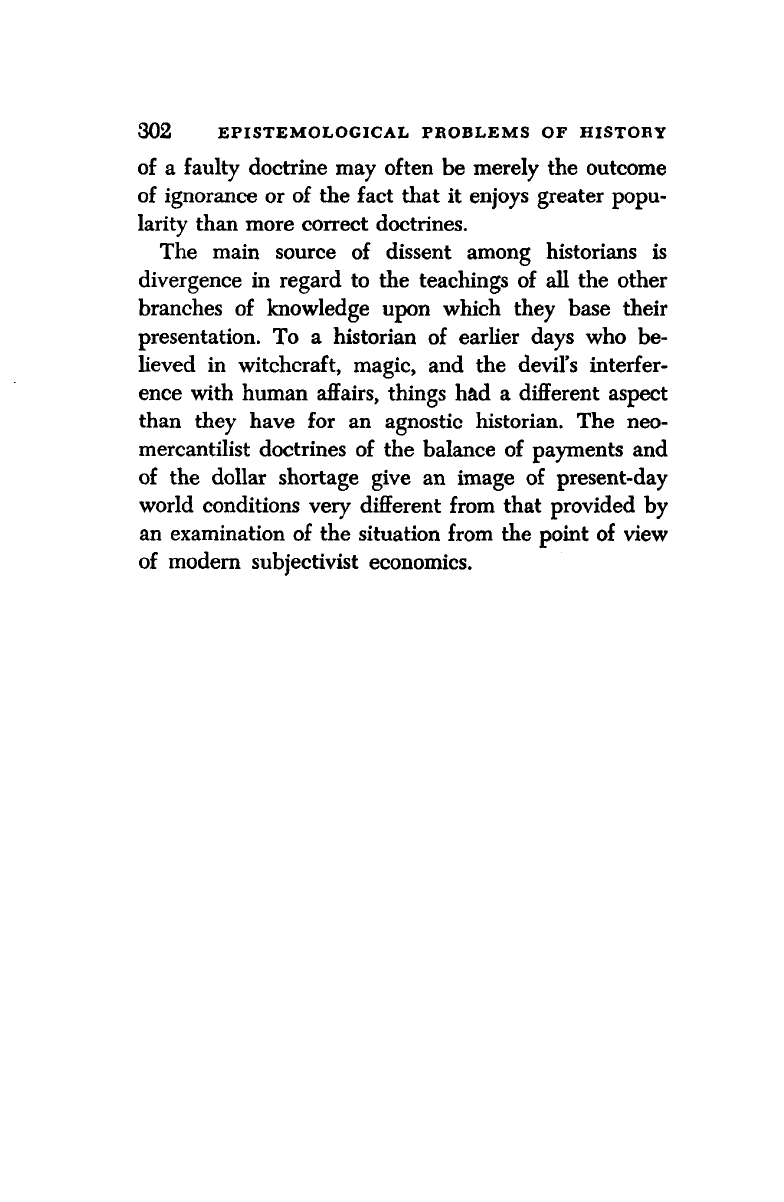
302 EPISTEMOLOGICAL PROBLEMS OF HISTORY
of a faulty doctrine may often be merely the outcome
of ignorance or of the fact that it enjoys greater popu-
larity than more correct doctrines.
The main source of dissent among historians is
divergence in regard to the teachings of all the other
branches of knowledge upon which they base their
presentation. To a historian of earlier days who be-
lieved in witchcraft, magic, and the devil's interfer-
ence with human affairs, things had a different aspect
than they have for an agnostic historian. The neo-
mercantilist doctrines of the balance of payments and
of the dollar shortage give an image of present-day
world conditions very different from that provided by
an examination of the situation from the point of view
of modern subjectivist economics.
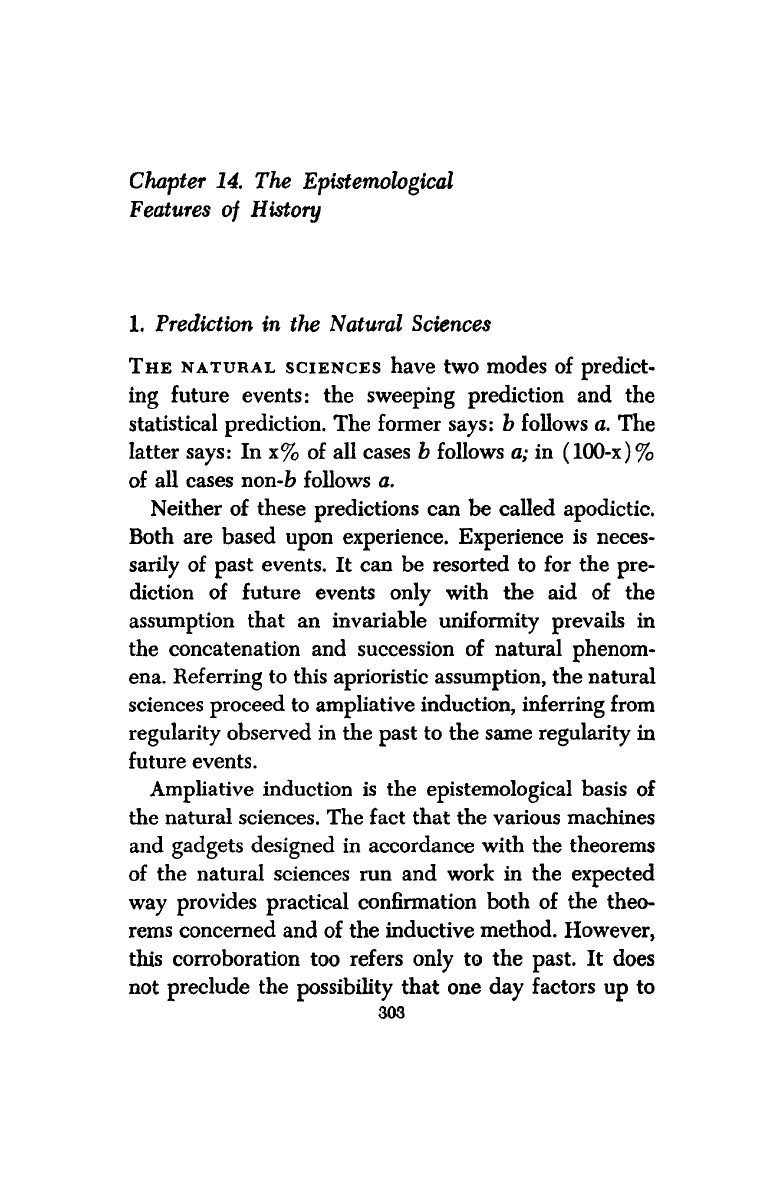
Chapter 14. The Epistemological
Features of History
1.
Prediction in the Natural Sciences
THE NATURAL SCIENCES have two modes of predict-
ing future events: the sweeping prediction and the
statistical prediction. The former says: b follows a. The
latter says: In x% of all cases b follows a; in (100-x)%
of all cases non-fc follows a.
Neither of these predictions can be called apodictic.
Both are based upon experience. Experience is neces-
sarily of past events. It can be resorted to for the pre-
diction of future events only with the aid of the
assumption that an invariable uniformity prevails in
the concatenation and succession of natural phenom-
ena. Referring to this aprioristic assumption, the natural
sciences proceed to ampliative induction, inferring from
regularity observed in the past to the same regularity in
future events.
Ampliative induction is the epistemological basis of
the natural sciences. The fact that the various machines
and gadgets designed in accordance with the theorems
of the natural sciences run and work in the expected
way provides practical confirmation both of the theo-
rems concerned and of the inductive method. However,
this corroboration too refers only to the past. It does
not preclude the possibility that one day factors up to
303
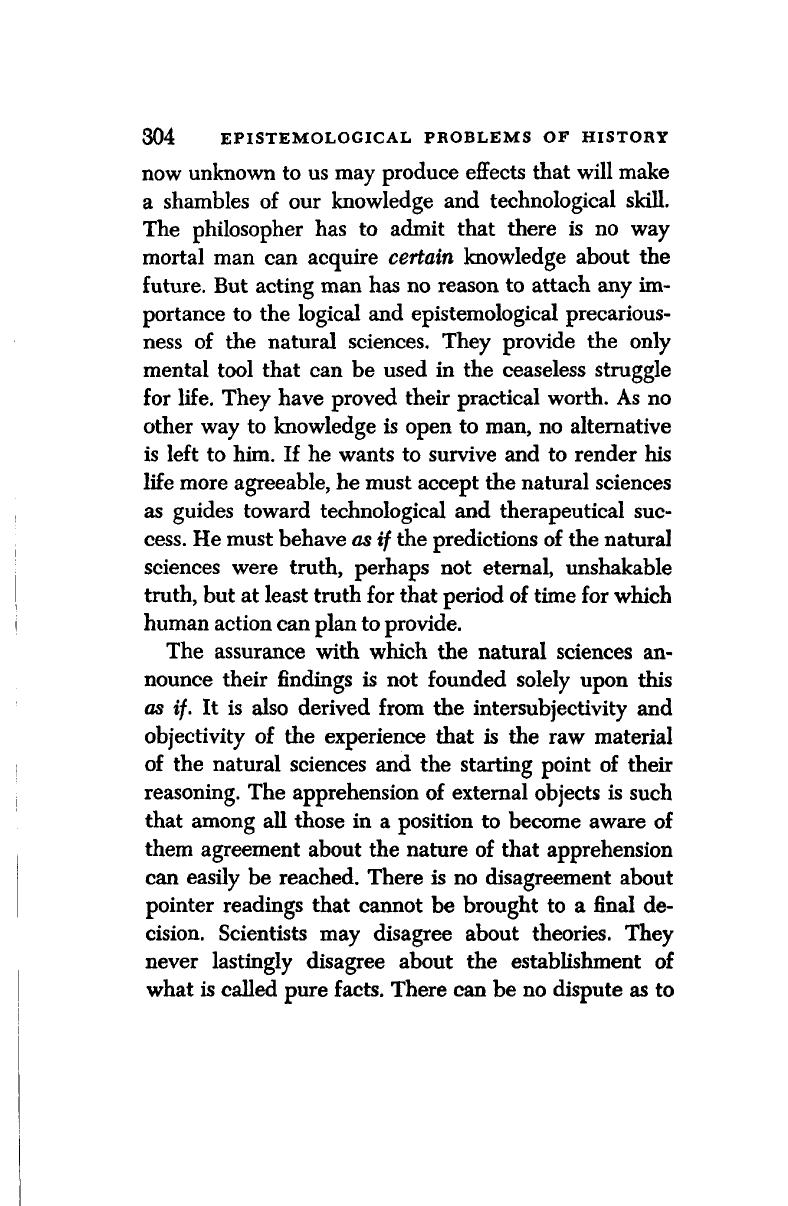
304 EPISTEMOLOGICAL PROBLEMS OF HISTORY
now unknown to us may produce effects that will make
a shambles of our knowledge and technological skill.
The philosopher has to admit that there is no way
mortal man can acquire certain knowledge about the
future. But acting man has no reason to attach any im-
portance to the logical and epistemological precarious-
ness of the natural sciences. They provide the only
mental tool that can be used in the ceaseless struggle
for life. They have proved their practical worth. As no
other way to knowledge is open to man, no alternative
is left to him. If he wants to survive and to render his
life more agreeable, he must accept the natural sciences
as guides toward technological and therapeutical suc-
cess.
He must behave as if the predictions of the natural
sciences were truth, perhaps not eternal, unshakable
truth, but at least truth for that period of time for which
human action can plan to provide.
The assurance with which the natural sciences an-
nounce their findings is not founded solely upon this
as if. It is also derived from the intersubjectivity and
objectivity of the experience that is the raw material
of the natural sciences and the starting point of then-
reasoning. The apprehension of external objects is such
that among all those in a position to become aware of
them agreement about the nature of that apprehension
can easily be reached. There is no disagreement about
pointer readings that cannot be brought to a final de-
cision. Scientists may disagree about theories. They
never lastingly disagree about the establishment of
what is called pure facts. There can be no dispute as to
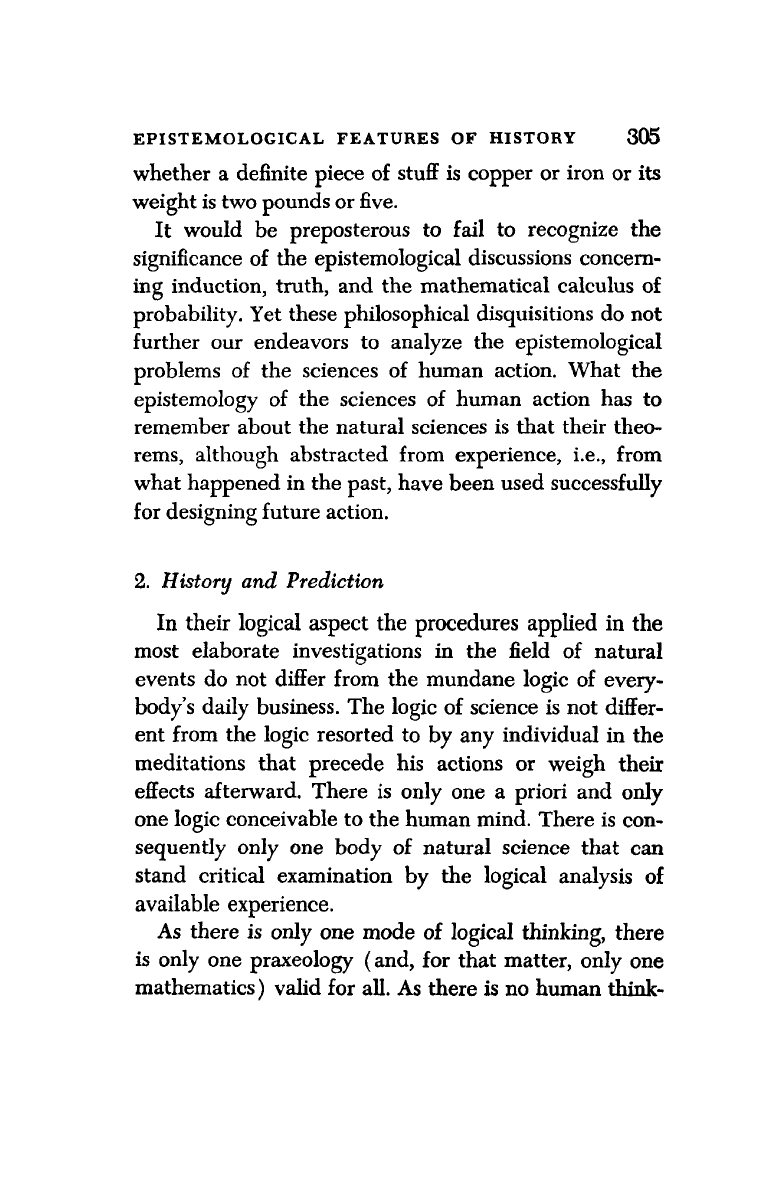
EPISTEMOLOGICAL FEATURES OF HISTORY 305
whether a definite piece of stuff is copper or iron or its
weight is two pounds or five.
It would be preposterous to fail to recognize the
significance of the epistemological discussions concern-
ing induction, truth, and the mathematical calculus of
probability. Yet these philosophical disquisitions do not
further our endeavors to analyze the epistemological
problems of the sciences of human action. What the
epistemology of the sciences of human action has to
remember about the natural sciences is that their theo-
rems,
although abstracted from experience, i.e., from
what happened in the past, have been used successfully
for designing future action.
2.
History and Prediction
In their logical aspect the procedures applied in the
most elaborate investigations in the field of natural
events do not differ from the mundane logic of every-
body's daily business. The logic of science is not differ-
ent from the logic resorted to by any individual in the
meditations that precede his actions or weigh their
effects afterward. There is only one a priori and only
one logic conceivable to the human mind. There is con-
sequently only one body of natural science that can
stand critical examination by the logical analysis of
available experience.
As there is only one mode of logical thinking, there
is only one praxeology (and, for that matter, only one
mathematics) valid for all. As there is no human think-
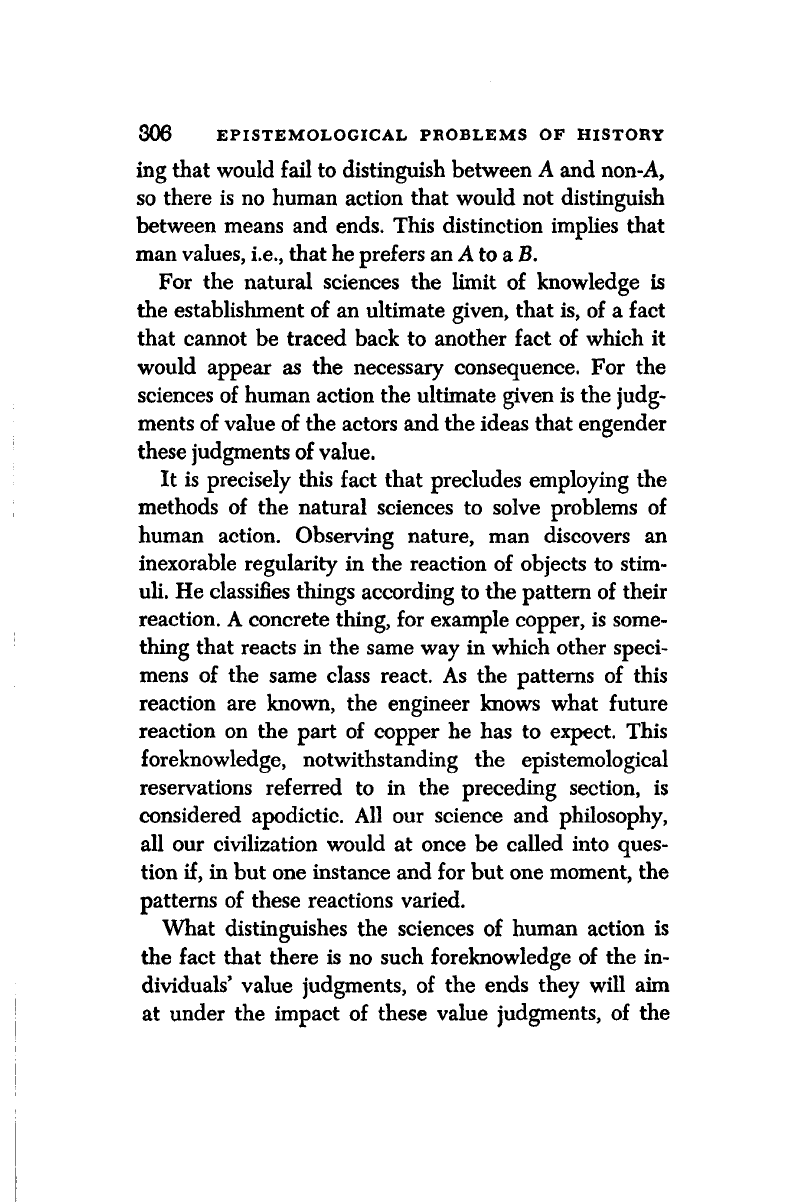
306 EPISTEMOLOGICAL PROBLEMS OF HISTORY
ing that would fail to distinguish between A and non-A,
so there is no human action that would not distinguish
between means and ends. This distinction implies that
man values, i.e., that he prefers an A to a B.
For the natural sciences the limit of knowledge is
the establishment of an ultimate given, that is, of a fact
that cannot be traced back to another fact of which it
would appear as the necessary consequence. For the
sciences of human action the ultimate given is the judg-
ments of value of the actors and the ideas that engender
these judgments of value.
It is precisely this fact that precludes employing the
methods of the natural sciences to solve problems of
human action. Observing nature, man discovers an
inexorable regularity in the reaction of objects to stim-
uli. He classifies things according to the pattern of their
reaction. A concrete thing, for example copper, is some-
thing that reacts in the same way in which other speci-
mens of the same class react. As the patterns of this
reaction are known, the engineer knows what future
reaction on the part of copper he has to expect. This
foreknowledge, notwithstanding the epistemological
reservations referred to in the preceding section, is
considered apodictic. All our science and philosophy,
all our civilization would at once be called into ques-
tion if, in but one instance and for but one moment, the
patterns of these reactions varied.
What distinguishes the sciences of human action is
the fact that there is no such foreknowledge of the in-
dividuals' value judgments, of the ends they will aim
at under the impact of these value judgments, of the
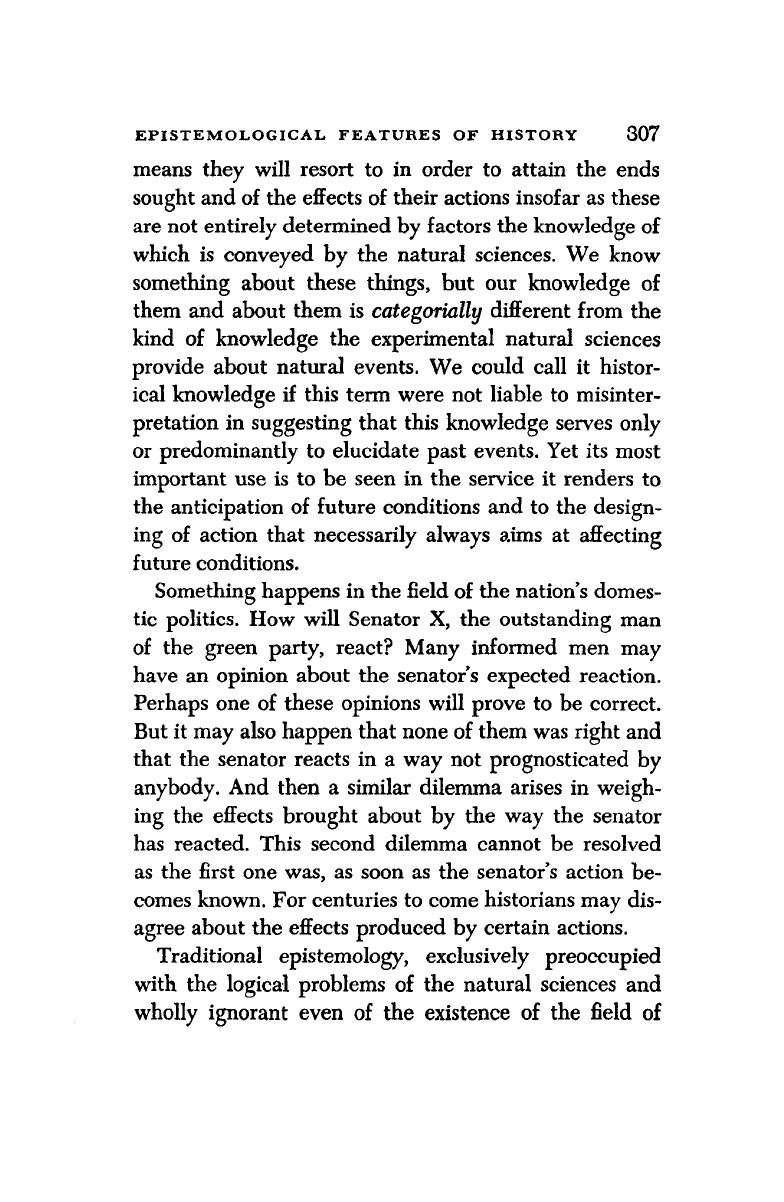
EPISTEMOLOGICAL FEATURES OF HISTORY 307
means they will resort to in order to attain the ends
sought and of the effects of their actions insofar as these
are not entirely determined by factors the knowledge of
which is conveyed by the natural sciences. We know
something about these things, but our knowledge of
them and about them is categorially different from the
kind of knowledge the experimental natural sciences
provide about natural events. We could call it histor-
ical knowledge if this term were not liable to misinter-
pretation in suggesting that this knowledge serves only
or predominantly to elucidate past events. Yet its most
important use is to be seen in the service it renders to
the anticipation of future conditions and to the design-
ing of action that necessarily always aims at affecting
future conditions.
Something happens in the field of the nation's domes-
tic politics. How will Senator X, the outstanding man
of the green party, react? Many informed men may
have an opinion about the senator's expected reaction.
Perhaps one of these opinions will prove to be correct.
But it may also happen that none of them was right and
that the senator reacts in a way not prognosticated by
anybody. And then a similar dilemma arises in weigh-
ing the effects brought about by the way the senator
has reacted. This second dilemma cannot be resolved
as the first one was, as soon as the senator's action be-
comes known. For centuries to come historians may dis-
agree about the effects produced by certain actions.
Traditional epistemology, exclusively preoccupied
with the logical problems of the natural sciences and
wholly ignorant even of the existence of the field of
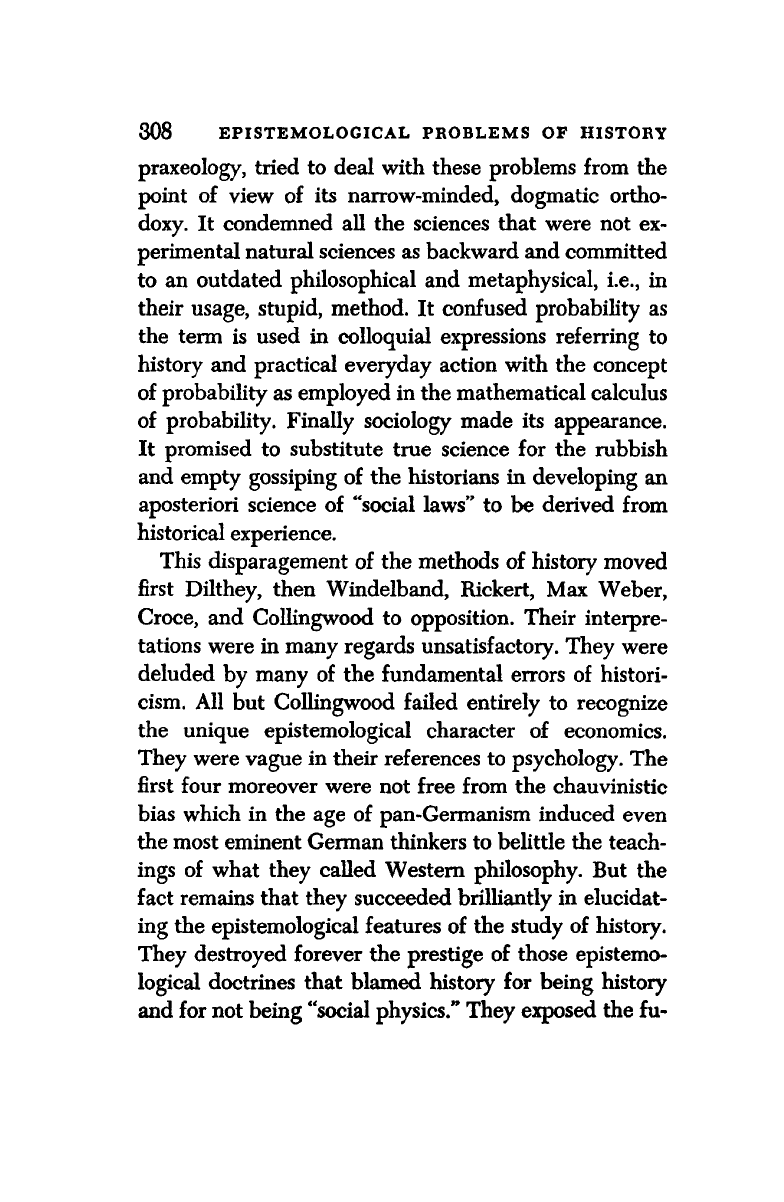
308 EPISTEMOLOGICAL PROBLEMS OF HISTORY
praxeology, tried to deal with these problems from the
point of view of its narrow-minded, dogmatic ortho-
doxy. It condemned all the sciences that were not ex-
perimental natural sciences as backward and committed
to an outdated philosophical and metaphysical, i.e., in
their usage, stupid, method. It confused probability as
the term is used in colloquial expressions referring to
history and practical everyday action with the concept
of probability as employed in the mathematical calculus
of probability. Finally sociology made its appearance.
It promised to substitute true science for the rubbish
and empty gossiping of the historians in developing an
aposteriori science of "social laws" to be derived from
historical experience.
This disparagement of the methods of history moved
first Dilthey, then Windelband, Rickert, Max Weber,
Croce, and Collingwood to opposition. Their interpre-
tations were in many regards unsatisfactory. They were
deluded by many of the fundamental errors of histori-
cism. All but Collingwood failed entirely to recognize
the unique epistemological character of economics.
They were vague in their references to psychology. The
first four moreover were not free from the chauvinistic
bias which in the age of pan-Germanism induced even
the most eminent German thinkers to belittle the teach-
ings of what they called Western philosophy. But the
fact remains that they succeeded brilliantly in elucidat-
ing the epistemological features of the study of history.
They destroyed forever the prestige of those epistemo-
logical doctrines that blamed history for being history
and for not being "social physics." They exposed the fu-
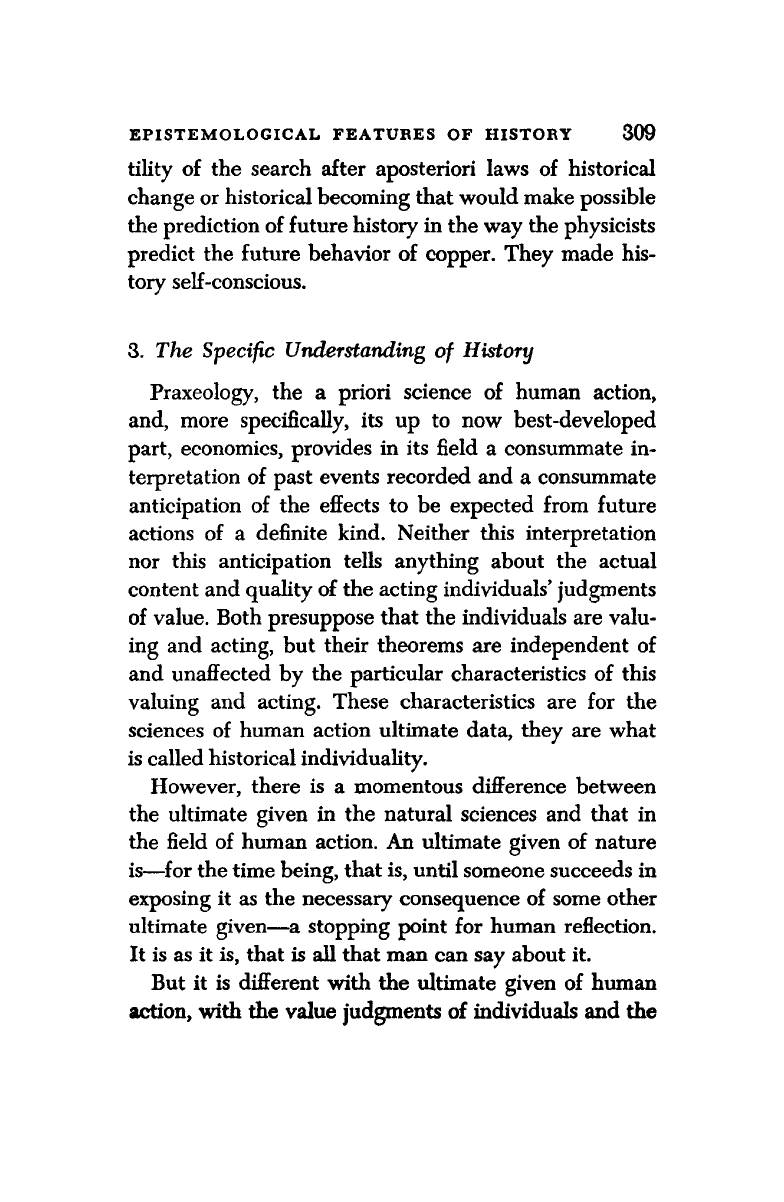
EPISTEMOLOGICAL FEATURES OF HISTORY 309
tility of the search after aposteriori laws of historical
change or historical becoming that would make possible
the prediction of future history in the way the physicists
predict the future behavior of copper. They made his-
tory self-conscious.
3.
The Specific Understanding of History
Praxeology, the a priori science of human action,
and, more specifically, its up to now best-developed
part, economics, provides in its field a consummate in-
terpretation of past events recorded and a consummate
anticipation of the effects to be expected from future
actions of a definite kind. Neither this interpretation
nor this anticipation tells anything about the actual
content and quality of the acting individuals* judgments
of value. Both presuppose that the individuals are valu-
ing and acting, but their theorems are independent of
and unaffected by the particular characteristics of this
valuing and acting. These characteristics are for the
sciences of human action ultimate data, they are what
is called historical individuality.
However, there is a momentous difference between
the ultimate given in the natural sciences and that in
the field of human action. An ultimate given of nature
is—f or the time being, that
is,
until someone succeeds in
exposing it as the necessary consequence of some other
ultimate given—a stopping point for human reflection.
It is as it is, that is all that man can say about it.
But it is different with the ultimate given of human
action, with the value judgments of individuals and the
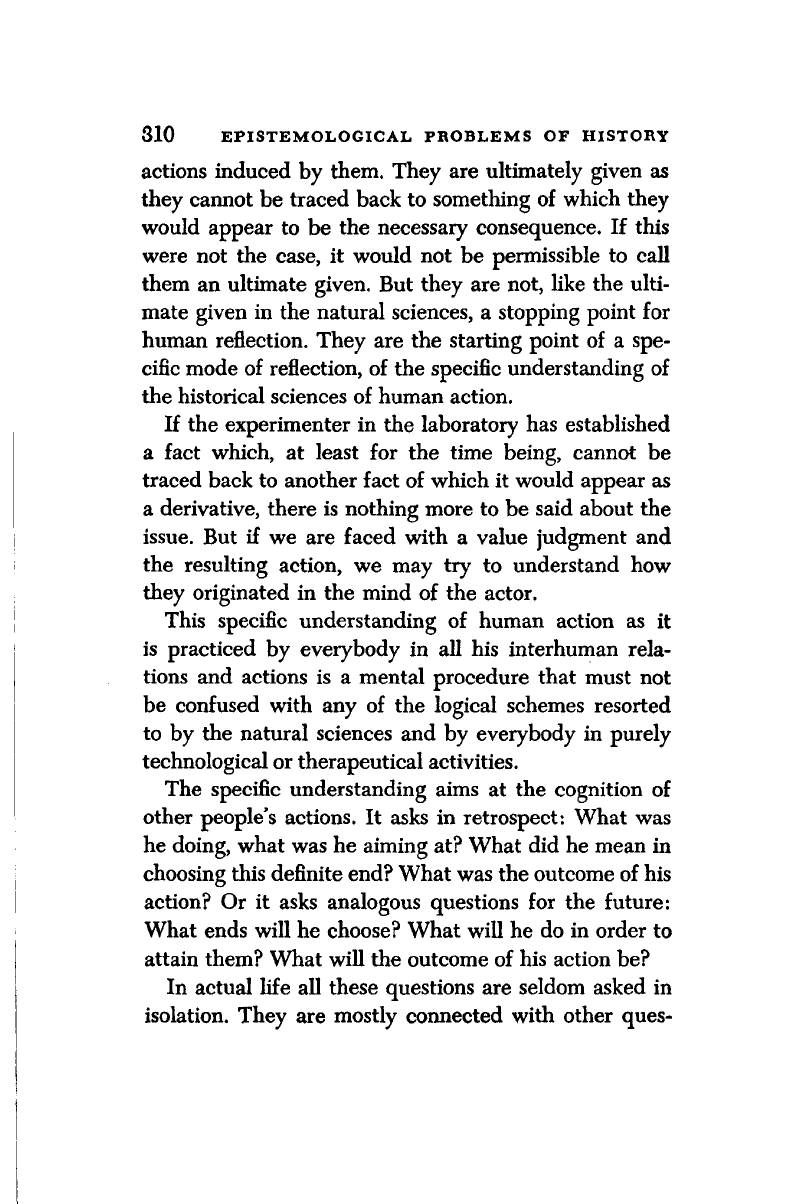
310 EPISTEMOLOGICAL PROBLEMS OF HISTORY
actions induced by them. They are ultimately given as
they cannot be traced back to something of which they
would appear to be the necessary consequence. If this
were not the case, it would not be permissible to call
them an ultimate given. But they are not, like the ulti-
mate given in the natural sciences, a stopping point for
human reflection. They are the starting point of a spe-
cific mode of reflection, of the specific understanding of
the historical sciences of human action.
If the experimenter in the laboratory has established
a fact which, at least for the time being, cannot be
traced back to another fact of which it would appear as
a derivative, there is nothing more to be said about the
issue. But if we are faced with a value judgment and
the resulting action, we may try to understand how
they originated in the mind of the actor.
This specific understanding of human action as it
is practiced by everybody in all his interhuman rela-
tions and actions is a mental procedure that must not
be confused with any of the logical schemes resorted
to by the natural sciences and by everybody in purely
technological or therapeutical activities.
The specific understanding aims at the cognition of
other people's actions. It asks in retrospect: What was
he doing, what was he aiming at? What did he mean in
choosing this definite end? What was the outcome of his
action? Or it asks analogous questions for the future:
What ends will he choose? What will he do in order to
attain them? What will the outcome of his action be?
In actual life all these questions are seldom asked in
isolation. They are mostly connected with other ques-
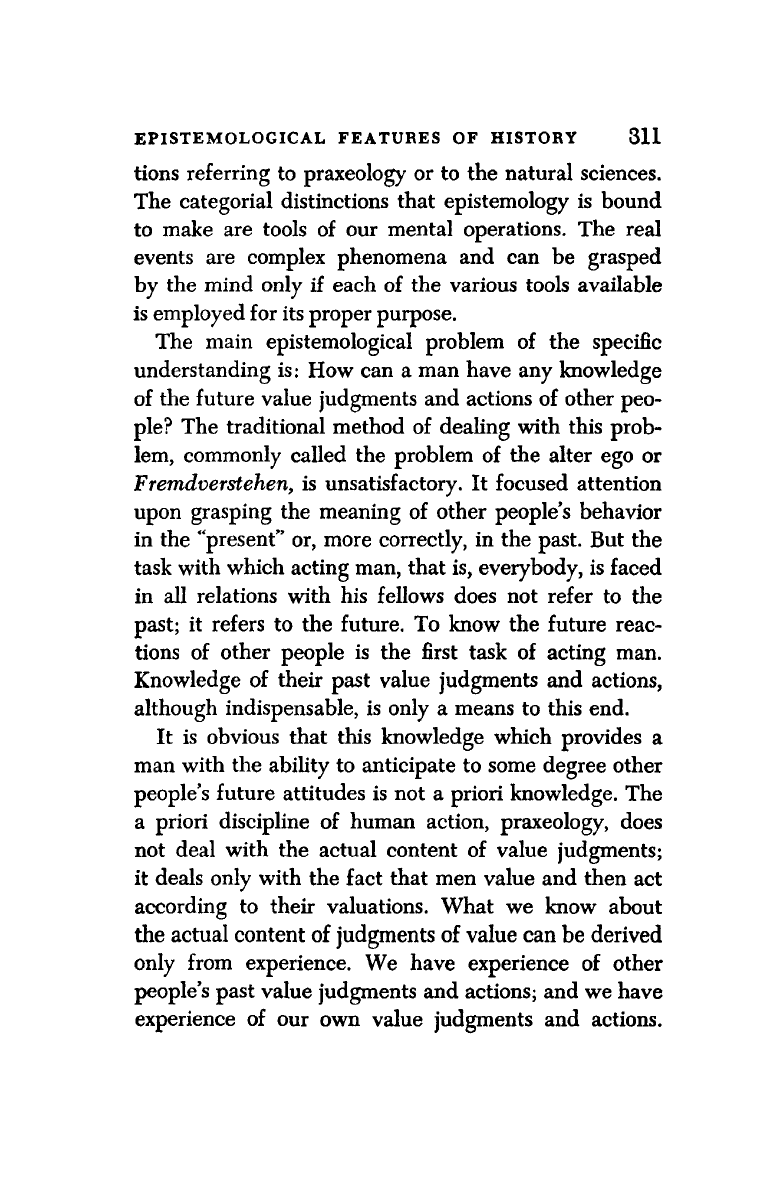
EPISTEMOLOGICAL FEATURES OF HISTORY 311
tions referring to praxeology or to the natural sciences.
The categorial distinctions that epistemology is bound
to make are tools of our mental operations. The real
events are complex phenomena and can be grasped
by the mind only if each of the various tools available
is employed for its proper purpose.
The main epistemological problem of the specific
understanding is: How can a man have any knowledge
of the future value judgments and actions of other peo-
ple? The traditional method of dealing with this prob-
lem, commonly called the problem of the alter ego or
Fremdverstehen, is unsatisfactory. It focused attention
upon grasping the meaning of other people's behavior
in the "present" or, more correctly, in the past. But the
task with which acting man, that is, everybody, is faced
in all relations with his fellows does not refer to the
past; it refers to the future. To know the future reac-
tions of other people is the first task of acting man.
Knowledge of their past value judgments and actions,
although indispensable, is only a means to this end.
It is obvious that this knowledge which provides a
man with the ability to anticipate to some degree other
people's future attitudes is not a priori knowledge. The
a priori discipline of human action, praxeology, does
not deal with the actual content of value judgments;
it deals only with the fact that men value and then act
according to their valuations. What we know about
the actual content of judgments of value can be derived
only from experience. We have experience of other
people's past value judgments and actions; and we have
experience of our own value judgments and actions.
